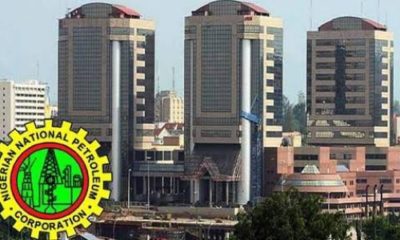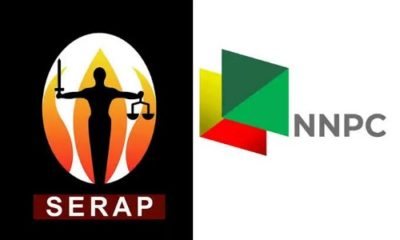Finance
Missing’ $20billion Oil Money: Our audit report not reliable—PricewaterhouseCoopers

By Yemie ADEOYE
ABUJA-The much anticipated report of the forensic audit of the Nigerian National Petroleum Corporation, NNPC, operations on the missing $20 billion oil money may not amount to much after all, with PricewaterhouseCoopers, the audit firm that conducted the probe, saying it cannot vouch for the integrity of its findings.
In a startling introductory letter addressed to Nigeria’s Auditor General, the audit firm said findings in its 199-page report were limited to available information and did not constitute a review in accordance with generally accepted standards.
“The procedures we performed did not constitute an examination or a review in accordance with generally accepted auditing standards or attestation standards,” the firm said.
“Accordingly, we provide no opinion, attestation or other form of assurance with respect to our work or the information upon which our work was based,” it added.
The report and all accompanying deliverables, the company pointed out, were “solely for the Office of the Auditor-General for the Federation, for their internal use and benefit and not intended to, nor may they be relied upon, by any other third party.
The firm concluded that the NNPC should refund to the government a minimum of $1.48 billion of missing oil funds, a figure many Nigerians believe is smaller than the likely actual figure.
The report however gave no strong and independent opinion of its findings despite saying the investigation was carried out using forensic techniques.
The firm instead listed a series of potential factors that could render its findings implausible, saying it had no access to the full account of some relevant agencies like NPDC, the upstream petroleum industry subsidiary of the NNPC.
The firm said where it lacked data, it turned to details of earlier investigations carried out by the Nigerian Senate, which all but cleared the NNPC, and the petroleum ministry of any wrongdoing.
“We did not obtain any information directly from NPDC, but in accordance with NPDC former Managing Director’s (Mr Briggs Victor) submission to the Senate Committee hearing on the subject matter, for the period, NPDC generated $5.11billion (net of royalties and petroleum profits tax paid),” the firm said.
PricewaterhouseCoopers also said without an independent legal opinion, it relied on the legal advice of the Nigerian government’s Attorney General (AG) on the subject of the transfers of various NNPC (55%) portion of Oil leases (OMLs) involved in the Shell (SPDC) Divestments which impact crude oil flows in the period.
“The AG’s opinion indicated that these transfers were within the authority of the Minister to make. Thus, these assets were validly transferred to NPDC. The same AG’s Legal Opinion also indicated that NPDC was to make payments for Net Revenue (dividend) to NNPC, which should ultimately be remitted to the Federation Account,” PwC said.
Still, the PwC said that although it reviewed documents submitted by the key parties involved, its work was conducted independently, with its findings based on the review of documentation, analytical reviews of data, and interviews conducted.
The firm said with the exception of the Deputy Group Managing Director/ Group Executive Director Finance and Accounts of NNPC, the Auditor-General for the Federation, and the Minister of Petroleum Resources, it did not discuss the findings of the report with anyone.
It is not clear for how much the Nigerian government hired the audit firm that has now delivered a report which it said should not be relied upon by Nigerians and the global community.
-Premium Times
Banking
CBN Denies Currency Devaluation

The Central Bank of Nigeria (CBN) has refuted claims of devaluing the.
Earlier reports suggested that the CBN had devalued the Naira, lowering its exchange rate from N631 to the dollar, compared to the previous day’s rate of N461.60 at the Importers and Exporters (I&E) window.
However, the Central Bank of Nigeria (CBN) released a statement on Thursday through its Acting Head of Corporate Communications, Dr. Isa Abdulmumin, categorizing the report as false information.
In the statement titled ‘CBN Has Not Devalued The Naira’, he said the attention of the apex bank was drawn to the news report by an Abuja based newspaper edition of June 1, 2023, titled “CB Devalues Naira To 630/51”.
However, the CBN stated categorically that the news report was replete with outright FALSEHOODS and destabilizing innuendos, ‘reflecting potentially willful ignorance of the said medium as to the workings of the Nigerian Foreign Exchange Market.’
“For the avoidance of doubt, the exchange rate at the Investors’ & Exporters (I&E) window traded this morning (June 1, 2023) at N465/USS1 and has been stable around this rate for a while.
“The public is hereby advised to ignore the news report by Daily Trust in its entirety, as it is speculative and calculated at causing panic in the market,” the CBN spokesman added.
He, therefore, advised media practitioners to verify their facts from the Central Bank of Nigeria before publishing in order not to misinform the public.
Banking
BREAKING: CBN Increases Interest Rate By 0.5%

The interest rate in Nigeria has been raised to 18.5 percent, up by 0.5 percent, from 18 percent where it was pegged in March 2023.
The Central Banks of Nigeria’s (CBN) Monetary Policy Committee (MPC) resolved to this effect at its third meeting of 2023 in Abuja, on Wednesday.
Governor, CBN, Godwin Emefiele, made the disclosure in the communiqué of the MPC’s meeting, thereafter.
While engaging the media at the end of the two-day meeting, Emefiele, said the committee voted to keep the asymmetric corridor at +100 and -700 basis points around the MPR.
In the view of the MPC, rising inflation rate is traceable to the high energy cost and challenges around the supply chain, among others, which lie outside the corridors of the CBN.
Emefiele said, “The current trend in price development would continue to be monitored by the bank with greater collaboration with fiscal authority to address the drivers of inflation.”
Biztellers reports that the CBN had effected six consecutive interest rate increases, which has seen the rate move from 11.5 percent in March 2022 to 18.5 percent in May 2023.
Finance
Dangers Lurk As Nigerians Resort To Refurbished Gas Cylinders

In Nigeria, people have been forced to come up with creative solutions to cope with the effects of inflation and the economic crisis.
These improvised strategies have not only helped individuals save money, but also enabled them to stay afloat during difficult times.
In a concerning development, the recent trend of boycotting the high cost of cooking gas cylinders in Nigeria may pose a greater risk to lives than it does in terms of saving money.
Economy&Lifestyle investigations have revealed that the soaring prices of gas cylinders have reached a point where it has become increasingly challenging for average households to afford them, let alone refill them with gas.
The situation is further exacerbated by the fact that the pump price of kerosene, which would typically serve as an alternative, has become prohibitively expensive.
Upon investigation, it was found that the prices of gas cylinders vary depending on their sizes. A 3kg gas cylinder is priced at N14,000, while a 5kg cylinder costs N16,000. The larger cylinders are even more costly, with a 6kg cylinder priced at N17,000 and a 12.5kg cylinder costing N19,000.
Additionally, the expense continues when it comes to filling these cylinders with cooking gas, as it costs N2,600 for a 3kg cylinder, N5,200 for a 6kg cylinder, N8,950 for a 10.5kg cylinder, and N10,650 for a 12.5kg cylinder.
Consequently, an average household that needs to replace a worn-out 5kg cylinder would have to come up with N20,250 to purchase a new cylinder and fill it with gas, which can be a difficult feat to achieve.
As a result, many people have resorted to refurbishing their old cylinders and trying to use them as best as they can. However, this approach poses a significant danger.
Mrs. Rukayat Adesoji, a trader, shared her experience regarding her gas cylinder, which had become rusted and could no longer stand upright since last month. Due to the exorbitant prices of purchasing new cylinders, she resorted to seeking the assistance of a welder.
The welder patched the legs of the cylinder, repainted it, and ever since then, she has been using the refurbished cylinder for her cooking needs.
She said ““My gas cylinder which was 6kg got rusted and no longer stands erect since last month. When I asked for the price, I was told it was N17, 500. I was discussing it with a friend who advised me to take it to a welder to paint it and construct a new stand. I heeded to her advice and at the end spent just N3, 000 to turn my cooking gas to a brand new.”
Apart from refurbishing cylinders, some people don’t even know when their cylinders will expire. Mrs. Mercy Opara, a hair stylist, falls in that category as she explained: “I am taking my gas cylinder to the welder to spray it for me. It just cost N1, 500.
“The cost of buying a new cylinder is high. I have been using my cylinder for over 7 years and I don’t even know the expiry date. I just pray God blesses me so that I can buy a new one. But this one I am managing will look neat after spraying it for another two years.”
Mr. Adekanbi Joseph, a wielder, said he paints cylinder and “To paint and rebuild a cylinder stand, I charge N4, 500. Many people come here to paint as a new cylinder is now very expensive to get.”
Highlighting the potential dangers of using refurbished cylinders, Mr. Benjamin Hope, the Chief Executive Officer of FKT Cooking gas and general goods, emphasized the risks involved.
He stated that even a brand new cylinder can pose a risk of explosion if the locks are not properly secured after use or if the cylinder filled with gas is moved from one location to another.
He said “A brand new cylinder can explode if the locks are not well keyed after using and if the cylinder filled with gas was moved from one place.
“There are many reasons for the high cost of gas cylinders in Nigeria. One is the cost of importation due to the exchange rate. Another is the increased migration from the use of kerosene to cooking gas which has necessitated increased demand for gas cylinders. You know that in such a case there will be increased importation of cylinders.”he added






















